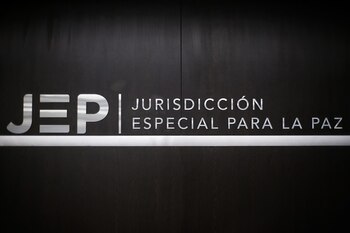
The Office of the Attorney General of the Nation announced this Thursday, March 24, that the new macrocases opened by the Special Jurisdiction for Peace (JEP) should be treated “in a comprehensive and non-exclusive manner, especially in those territories where there are no security conditions for victims”.
“A large part of the territories where there are distant victims have not had enough opportunity to recognize this project, a situation that is a clear indicator that the guarantee of non-repetition provided for in the Peace Agreement has not reached those territories,” said the Delegate Procurator with Coordination Functions before the JEP, Jairo Acosta Aristizábal.
Similarly, during the intervention he made in one of the last hearings of victim observations organized by the JEP in different departments of the country, Acosta Aristizábal specified that “there can be no ignorance or exclusion of the conditions of the victims of the armed conflict, insofar as any delay or delay may involve re-victimization and action with harm”.
He also argued that it is of great importance that all macro-cases addressed by this transitional justice assume a pro-victim interpretation, in which none of them are left out.
It may interest you: The case of sexual abuse that ended with a burnt school in Bogotá
But he also added that for the three new macrocases opened and the continuity of the seven existing ones, a vigorous platform is required in the JEP, as well as strengthening the Recognition Chamber because “we fear that it may happen that it may not have the strength, although the intentions do, to be able to evoke the cases that arrive, and we would also be concerned about it. very much that the exercise is neglected or interrupted in cases that progress”.
A report that was presented to the Chamber for Recognition of Truth, Responsibility and Determination of Facts and Conduct (SRVR), of the Special Jurisdiction for Peace, calls for guaranteeing the rights of access to justice, truth and reparation for small traders and peasants.
It states that murders were committed as retaliation for non-payment of extortion or failure to comply with orders of the extinct FARC; deprivation of liberty developed under the modality of kidnapping for extortion purposes, social and territorial control. In addition, subjection to unworthy treatment through constant threats and humiliation for the payment of extortion.
Semana published sections of the 40-page document, where they point out that despite the investigations carried out by the JEP into crimes committed against members of the productive sector, it should be emphasized that the facts must be recognized as systematized attacks, generating adverse effects such as discouraging production in various sectors, effects on private property and the right to work. They also ask to identify those responsible for such crimes in order to reconstruct the truth.
“Members of this sector must receive differentiated treatment by the JEP, while they were systematically and recurrently victimized by the FARC,” the document states. In addition, he assures that: “Although economic reparation is not called for, clarity is sought in the role played by the FARC in affecting a large part of these sectors.”
It is important to note that other facts presented point to forced displacement; destruction, wrongful and arbitrary appropriation of property for the financing of the guerrilla group, sometimes making indiscriminate use of explosive devices.
KEEP READING:
Últimas Noticias
Debanhi Escobar: they secured the motel where she was found lifeless in a cistern
Members of the Specialized Prosecutor's Office in Nuevo León secured the Nueva Castilla Motel as part of the investigations into the case

The oldest person in the world died at the age of 119
Kane Tanaka lived in Japan. She was born six months earlier than George Orwell, the same year that the Wright brothers first flew, and Marie Curie became the first woman to win a Nobel Prize

Macabre find in CDMX: they left a body bagged and tied in a taxi
The body was left in the back seats of the car. It was covered with black bags and tied with industrial tape
The eagles of America will face Manchester City in a duel of legends. Here are the details
The top Mexican football champion will play a match with Pep Guardiola's squad in the Lone Star Cup

Why is it good to bring dogs out to know the world when they are puppies
A so-called protection against the spread of diseases threatens the integral development of dogs




